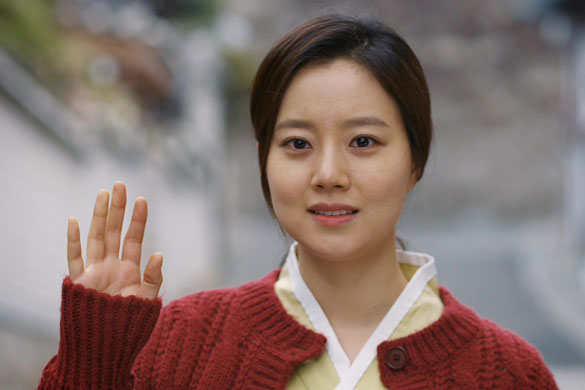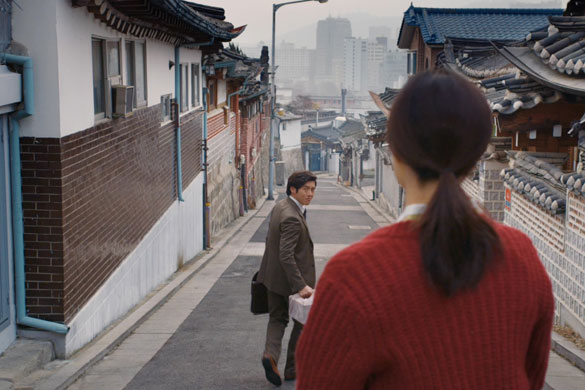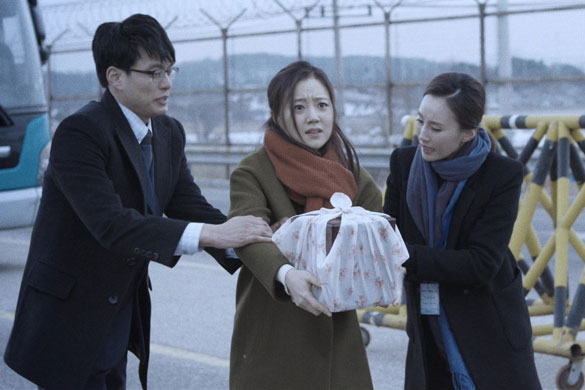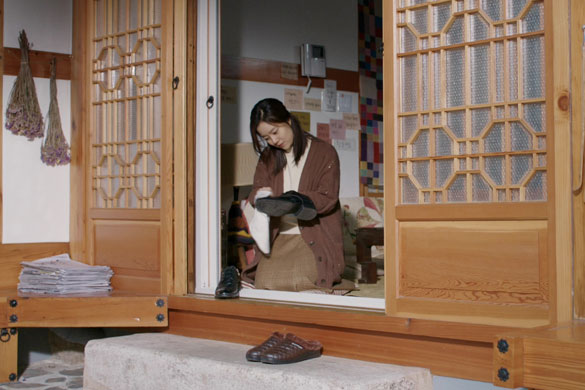"My memory gets plucked from me and runs away like a chemo patient's hair.
It's scary... Will Min-woo go away, too?"
Synopsis:
Yeon-hee (Moon Chae-won) is seemingly an ordinary young woman in her twenties who spends the majority of her days preparing for and indeed excitedly awaiting what she believes is the imminent return of the love of her life - her husband, Min-woo (Ko Soo) - from a trip to North Korea.
However, though she daily cleans her house from top to bottom; visits the local market to buy as much food as she can carry; and cooks a sumptuous 'Welcome Home' meal for her husband, Yeon-hee's memory isn't what it once was, to say the least. For, far from being in the prime of her life with a husband who left on a brief journey just a few days ago, Yeon-hee is in actuality an octogenarian who has been separated from Min-woo for more than 60 years, since Korea's division into north and south.
On being told that 86-year-old Min-woo has been found to still be alive, Yeon-hee is somewhat confused but the news that she is to be taken on a bus journey to see him at the north/south border nonetheless fills her ever-aching heart with the hope that the day she has so long yearned for may finally, finally have come, even if she's not entirely aware of just how long she's waited...
Review:
Over the years, while Hangul Celluloid film reviews/dissections have certainly lengthened - gradually becoming more involved and (hopefully) more in-depth - the general format in which they appear has largely remained as it was at the very outset of the site; the use of a brief narrative synopsis followed by a main critique (the meat and bones of the piece, if you will) and suffixed with a summation of overall thoughts not just seeming the obvious - and I feel right - choice but more often than not being almost de rigueur.
However, though rare, there have been instances ('Miss the Train' and 'A Tale of Two Sisters' spring immediately to mind) where the nature and indeed beauty of a narrative's unfolding has made me consider omitting a synopsis altogether - all the more difficult though that would make the review - for fear of somehow undermining the very nuanced elements I'm attempting to underline.
'Awaiting' is another case in point and though I ultimately decided (in both this instance and the aforementioned) to include a synopsis after all, I did so only after taking pains to as much as possible ensure no spoiler detraction from narrative nuance.
Of course, such efforts could be said to be part of every review but in discussions of films like 'Awaiting' - where narrative beauty comes not least from the manner in which the gradual and ever gentle discovery of layer upon layer within an outwardly seemingly simple tale is made - they are, I feel, all the more necessary.
 |
'Awaiting' opens with a gentle, single piano accompaniment to Yeon-hee's bus journey to the north/south border in what we later realise is a brief step forward in time towards the narrative's culmination. While, as already stated, our heroine appears as a young woman in her twenties, from the very outset and continuing throughout the film's entire running time director Kang Je-gyu provides a myriad of visual clues to the real state of play: We see Yeon-hee listening to music through in-ear headphones, as one would expect a young traveller to, but on closer inspection her clothes clearly sit hugely at odds with her apparent persona: A frumpy dress, a winter cardigan, woollen stockings and shoes that have long been out of style positively scream elderly lady and when combined with the (briefly referenced) fact that all the other bus passengers are in their twilight years they subtly tell viewers that Yeon-hee's youthful appearance is wholly, and only, her own self-perception, and in seeing her as she sees herself we are in fact looking at the world through her eyes.
Yeon-hee's flicking through images on her phone while travelling (still in the very first scene) underlines this idea further and just as viewers do not (and could not, at this point in proceedings) recognise the elderly lady and middle-aged woman in the pictures, Yeon-hee too is clearly and visibly confused as to who they are. Her (and viewers') lack of recognition and resultant confusion is soon, however, replaced with a gentle smile as Yeon-hee finally finds an image of herself as a young woman (a face with which we are also familiar) standing next to the man for whom, we later discover, she put her entire life on hold.
And therein, to my mind, lies one of the major (though unspoken) ideas within 'Awaiting': The thought that even though she is soon shown to have severe problems with her memory and difficulty in telling the past from the present - likely as a result of an Alzheimer's type disease - at least part of the reason she continues to perceive herself as the young girl she once was is because everything stopped for her on the day Min-woo walked off into the distance, all those years ago... an event as heartbreaking to her now and as immediate in her thoughts as it has been every single day since he left.
It's of course highly unlikely these realisations will fully come to viewers this early on, but the seeds have been sown subconsciously, nonetheless, even before the story gets underway in earnest.
 |
Following this brief early scene, we are taken back in time to be formally introduced to Yeon-hee by way of a narrative monologue - a spoken diary, if you will, of her daily activities (her cleaning, shopping, tablet taking and her conversations with 'Sarah' in the US) in the form of almost a conversation with viewers - and virtually straight away the ongoing issues with Yeon-hee's memory are brought directly into view.
The fact that the narrative timeline has so far not been linear fits perfectly with Yeon-hee's confused perceptions of the timing of events taking place and her difficulty in distinguishing past from present - viewers thereby again being placed in a similar situation - and director Kang Je-gyu deftly accents this further as Yeon-hee discusses and takes her daily medication: With each of six tablet she ingests she remembers an occurrence from the day's events, making a note of it, in the process, but her 'memories' are shown to viewers in much later scenes with the nonlinear timeframe almost giving the feeling that those instances perhaps occurred subsequently rather than previously. Straight away, our uncertainty of when exactly specific events took place exactly mirrors that of Yeon-hee.
Add to that, with Yeon-hee's noting of seeing Min-woo in her daily activity listing; her being convinced that she repeatedly hears him calling to her, daily; and her dreams of being reunited with him (quickly turning into blood-soaked nightmares) we are consistently told, once again, that Yeon-hee's life ground to a halt the very moment Min-woo walked out of her life; a day she has no choice but to relive over and over again.
Obviously, the climax of Awaiting's narrative comes with Yeon-hee's journey to, and arrival at the north/south border for a meeting with the love of her life and though any story detailing difficulties between North and South Korea can almost not fail to have political undertones, Kang Je-gyu wisely circumvents any personal statements or opinions; choosing instead to focus on the heartwrenching pain such enforced separation has on those involved. However, poignant though these climactic scenes are (and, believe me, they are truly poignant) it is the subsection final moments of the film that speak volumes in relation to the (aforementioned) ideas detailed throughout the entire running time: In two almost identical scenes we watch Yeon-hee waving farewell to Min-woo... In one, the (present day) cityscape can be seen in the background, far behind the almost dirt road down which Min-woo walks as Yeon-hee waves him goodbye; in the other, the background to the road is countryside and mountains, as it was 60 years in the past.
In short, in both the past and the present all Yeon-hee has been able to see is the love of her life walking away.
As a final point on the narrative beauty present in 'Awaiting', Yeon-hee as she really is in the present is brought into view as Sarah (her daughter) berates her mother for pushing everything and everyone away in her yearning for Min-woo, and though saying too much on the subject would risk detracting from its effectiveness the gently understated - almost matter of fact - nature with which Yeon-hee is (temporarily) brought back to reality is moving to the nth degree; one of the strongest points in an utterly superlative cinematic work.
 |
In recent years, academic institutions such as the Korea National University of Arts and the Korean Academy of Film Arts have enabled the production of numerous Korean shorts, many of which are not just exemplary but wholly original, too. Not only that, but often such shorts also show a different side to Korean cinema from the perceived 'norm' of bigger budget studio produced feature length fare (with the added advantage of a shorter running time precluding extraneous content and/or padding) or indeed serve as much needed and, to my mind, welcome antitheses to far more often seen - and some might say thereby jaded - cinematic themes. In latter years, too, bigger film production and sales companies including Mirovision and Amuse Films have helmed and/or acquired a number of Korean shorts increasing the hope of greater access for audiences than has previously been the case.
However, incredibly positive though such moves unquestionably are, the very nature of shorts as a whole - and indeed the way they're perceived by many - means they're still rarely screened outside of film festivals and in the case of superlative examples like 'Awaiting', 'Sprout', 'M.J.' and 'Miss Longlegs' (to name but a few) that is rather a shame. For, whether created as arts students' graduation projects; made by new film-makers attempting to break into the features industry; or allowing established directors to try out new genres and ideas, such films truly deserve to be seen by each and every Korean cinema fan, regardless of their diminutive length.
Summary:
A touching, affecting story of aging, separation and yearning within a life put on hold for love, Kang Je-gyu's short 'Awaiting' is, at just 26 minutes in duration, easily as worthy of attention, discussion and indeed acclaim as any feature-length drama you could name.
'Awaiting' (민우씨 오는 날) / 2014
Directed by: Kang Je-gyu
Cast: Moon Chae-won, Ko Soo, Son Sook
Duration: 26 minutes (approx.)
|





